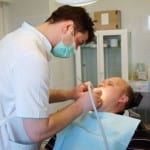 Gum disease is one of the most common dental health issues. There’s good and bad news when it comes to gum disease. The bad news is that it can cause irreparable damage to your gums and the bone structure beneath. The good news is that it can be prevented. If you’re worried about gum disease, here are some tips to help you spot the danger signs and keep your gums healthy.
Gum disease is one of the most common dental health issues. There’s good and bad news when it comes to gum disease. The bad news is that it can cause irreparable damage to your gums and the bone structure beneath. The good news is that it can be prevented. If you’re worried about gum disease, here are some tips to help you spot the danger signs and keep your gums healthy.
Spotting the signs of gum disease
Mild gum disease can be treated, but if it’s left to develop, gum disease can result in severe symptoms, and even premature tooth loss. If you spot the warning signs, see your dentist as soon as possible. Don’t wait for your next scheduled appointment. The most common signs of gum disease include:
- Swollen gums
- Bleeding gums (usually this is most noticeable when you brush your teeth)
- Redness in the gums
- Painful gums
When gum disease becomes more advanced, you may also notice that your gums have receded (this can make the teeth look longer than normal) and you may experience an unpleasant taste in your mouth.
Preventing gum disease
Gum disease is preventable, and your best weapon against unwanted symptoms is good oral hygiene. Gum disease is caused by harmful bacteria, which combine with food debris and saliva to form a substance called plaque. The bacteria in plaque release acids, which irritate the gums, and cause them to become painful and inflamed. If you brush twice a day and follow your dentist’s hygiene recommendations, you should be able to keep gum disease at bay. We also recommend regular dental checks, and avoiding a sugary diet. Smoking can also increase your risk of gum disease. If you do spot signs, call and make an appointment as quickly as possible. The sooner we can treat you, the lower the risk of permanent damage.
















